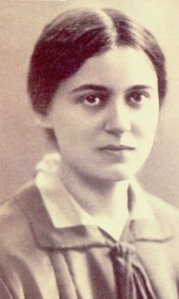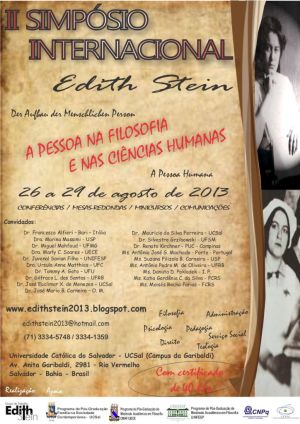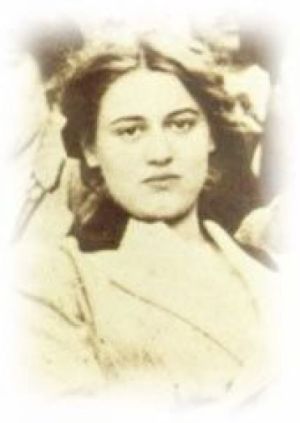II Simpósio Internacional Edith Stein – Acessar: http://edithstein2013.blogspot.com.br/
Edith Theresa Hedwing Stein (Breslau, 12 de Outubro de 1891 — Auschwitz, 9 de Agosto de 1942) foi uma filósofa e teóloga alemã. De origem judia, converteu-se posteriormente ao catolicismo, tornando-se carmelita descalça. Primeira mulher a defender uma tese de Filosofia na Alemanha, foi discípula e depois assistente de Edmund Husserl, o fundador da fenomenologia.1 Faleceu aos 51 anos, no campo de concentração de Auschwitz. Em 11 de outubro de 1998, foi canonizada pelo papa João Paulo II, como Santa Teresa Benedita da Cruz. (http://pt.wikipedia.org/wiki/Edith_Stein)
GRUPO DE TRABALHO EDITH STEIN – ANPOF – http://gtedithstein.blogspot.com.br/
III Simposio sobre Edith Stein – “Cuestiones de fe y razón en Edith Stein”. – Chile
«Ahora que soy creyente, debo reflexionar». Itinerario de la relación entre razón y fe en Edith Stein.”
![]()
![]()
 Edith Stein, saintly Carmelite, profound philosopher and brilliant writer, had a great influence on the women of her time, and is having a growing influence in the intellectual and philosophical circles of today’s Germany and of the whole world. She is an inspiration to all Christians whose heritage is the Cross, and her life was offered for her own Jewish people in their sufferings and persecutions.
Edith Stein, saintly Carmelite, profound philosopher and brilliant writer, had a great influence on the women of her time, and is having a growing influence in the intellectual and philosophical circles of today’s Germany and of the whole world. She is an inspiration to all Christians whose heritage is the Cross, and her life was offered for her own Jewish people in their sufferings and persecutions.
Born on October 12, 1891, of Jewish parents, Siegried Stein and Auguste Courant, in Breslau, Germany, Edith Stein from her earliest years showed a great aptitude for learning, and by the time of the outbreak of World War I, she had studied philology and philosophy at the universities of Breslau and Goettingen.”
(http://www.ewtn.com/faith/edith_stein.htm)


“The International Association for the Study of the Philosophy of Edith Stein (IASPES), immediately nicknamed ‘The Stein Circle’ by its first adherents, was founded in June 2009. It comprises Stein scholars from all over the world, and hence works mostly, but not exclusively, in English. Its aim is to explore and disseminate the thought of Edith Stein by organising conferences, preparing publications and providing a platform for contact and discussion among Stein scholars.
Edith Stein has been known for her exemplary life since her beatification in 1987 and subsequent canonization in 1998. Attention focussed in this manner, although also justified, has had the unfortunate side effect of overshadowing the fact that she played a key role in the phenomenological movement and was herself what we must call a great philosopher.
Her trajectory, starting with an analysis of empathy, an exploration of the constitution of intersubjectivity and an investigation of the state as the intersubjectively constituted subject of historical experience in modernity, allows her to base her later philosophical anthropology and engagement with the meaning of being on an explicitly phenomenological exploration of the social construction of reality. It is the sophistication of this perspective that allows her to take revealed Christianity into account as regulative for the believer’s constitution of the world and hence engage with Scholasticism while remaining true to the phenomenological method. It is also this perspective that allows for St. John of the Cross’ mysticism of the night to penetrate her thought completely so that conscious not-knowing becomes the key to the soul’s maturation and to a consequently more adequate perception of reality.” ( http://www.edithsteincircle.com/ )





